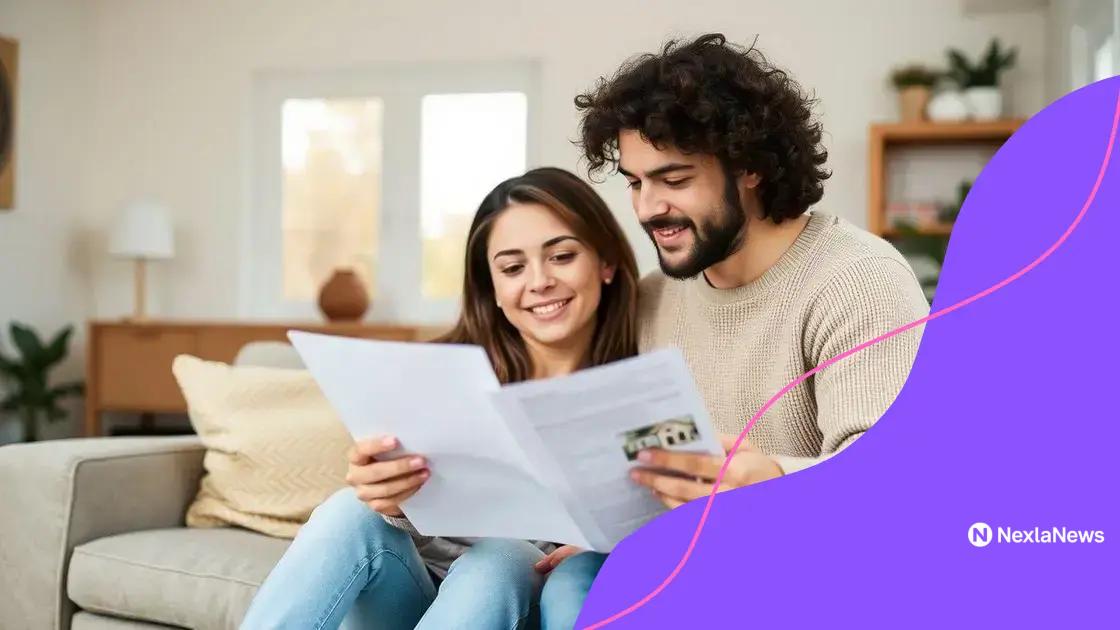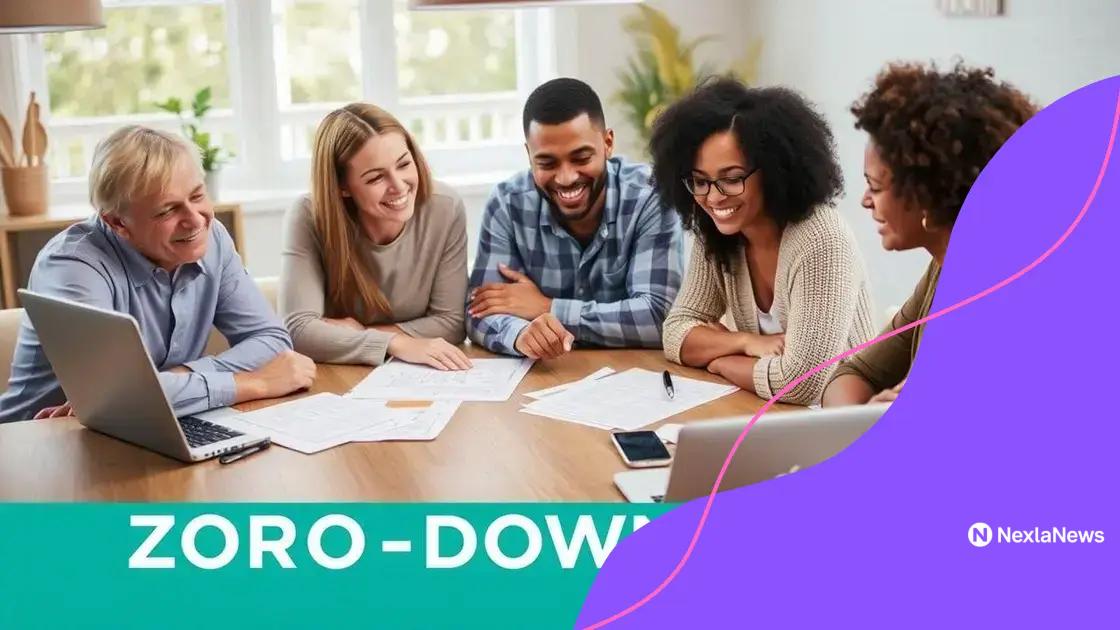Zero down home loan: Your path to affordable housing

A zero down home loan allows buyers to purchase a home without making a down payment, making it an accessible option for many first-time homebuyers, though it may come with higher interest rates and less initial equity.
Have you ever thought about how a zero down home loan could change your life? For many aspiring homeowners, these loans offer a chance to buy a home without needing a hefty down payment, which can seem daunting. Let’s dive into how this option works and who it could benefit.
Understanding zero down home loans
Understanding zero down home loans is essential for anyone looking to buy a home without a hefty upfront cost. These innovative loans allow potential homeowners to bypass the traditional down payment requirement, making homeownership more accessible.
Many people may wonder how these loans work. Essentially, they enable buyers to secure a mortgage without needing to put any money down, which can be a major hurdle for many. But what does this mean in practice?
Eligibility for zero down home loans
To qualify for a zero down loan, certain criteria must be met. Lenders typically look for:
- A stable income
- Good credit history
- Low debt-to-income ratio
If you meet these conditions, you’re on your way to potentially securing a zero down home loan.
Types of zero down home loans
There are different types of zero down home loans available to borrowers. They include:
- VA loans for veterans and active military
- USDA loans for rural properties
- Some state-specific programs offering assistance
Each type comes with its own eligibility requirements, so it’s crucial to do your research. Opting for a zero down loan can help you get into your new home sooner and build equity without the need for substantial savings.
Eligibility criteria for zero down loans
Understanding the eligibility criteria for zero down loans is crucial for anyone looking to take advantage of this financing option. Lenders have specific requirements to ensure that borrowers are capable of repaying a loan without a down payment.
First, you typically need a reliable income to demonstrate that you can handle monthly payments. But what else do lenders look for?
Key requirements
Many lenders will examine your credit history, focusing on your credit score. Generally, a score of 620 or higher is preferred to qualify. Additionally, a low debt-to-income ratio is important, which means your monthly debts should be a small portion of your income. Overall creditworthiness plays a significant role in the approval process.
- Stable income: Make sure you have a consistent source of income.
- Credit score: Aim for a score above 620.
- Debt-to-income ratio: Keep your monthly debts low compared to your earnings.
These factors are vital in determining whether you can secure a zero down loan. Remember, each lender may have slightly different requirements, so it’s wise to check with several sources to find the best fit for your situation.
As you navigate this process, consider seeking advice from a financial specialist. They can help clarify any uncertainties and assist you in meeting specific eligibility standards. Your journey to homeownership with a zero down loan can be smoother with the right guidance.
Types of zero down loans available

When looking into types of zero down loans available, it’s important to understand the various options that can help you secure financing without a down payment. Each type may cater to different needs and borrower qualifications, allowing more people to achieve their dream of homeownership.
One popular option is the VA loan, which is specifically designed for veterans and active military members. These loans not only allow for zero down payment, but they also come with competitive interest rates.
USDA loans
Another option is the USDA loan, which is aimed at buyers looking to purchase homes in rural areas. These loans help promote homeownership in less populated regions. They also come with flexible credit requirements and can require no down payment as long as you meet the income eligibility criteria.
- VA Loans: For veterans and active military members.
- USDA Loans: Targeted at rural purchasers.
- State-specific programs: Some states offer unique programs that provide zero down financing.
In addition to these options, some lenders may offer specific programs that provide zero down loans for first-time homebuyers. These loans can often include incentives such as reduced fees or mortgage insurance, making it easier to buy your first home.
Before applying, it’s essential to research all available types of zero down loans and determine which one aligns best with your financial situation and homeownership goals. Each option carries its own set of requirements, so understanding these can help you make an informed decision.
Pros and cons of zero down mortgages
Exploring the pros and cons of zero down mortgages can help potential buyers decide if this option is right for them. These mortgages come with distinct advantages and disadvantages that are essential to consider.
One significant advantage is that they allow buyers to purchase a home without needing a down payment. This can make homeownership more accessible, especially for first-time buyers. Additionally, zero down mortgages can help buyers enter the market faster, which is beneficial in competitive housing environments.
Advantages of zero down mortgages
Some key benefits include:
- Accessibility: Ideal for those who may not have enough savings for a down payment.
- Faster homeownership: Enter the property market sooner than traditional financing allows.
- Retained savings: Keep funds available for emergencies or renovations.
However, there are also downsides to consider. Zero down mortgages often come with higher interest rates, which means monthly payments might be steeper. Additionally, without a down payment, the borrower has less equity in the home, making it harder to refinance or sell if needed.
Disadvantages of zero down mortgages
Some challenges associated with these loans include:
- Higher interest rates: You may pay more over the loan’s lifetime compared to traditional loans.
- Less equity: Starting without equity can be risky if home values decline.
- Potential for PMI: You may be required to pay private mortgage insurance, adding to overall costs.
As with any financial decision, it is crucial to weigh the pros and cons carefully. Understanding these aspects can help you make an informed choice about pursuing a zero down mortgage.
Tips for applying for a zero down loan
When considering tips for applying for a zero down loan, it helps to understand the process and what lenders expect. Getting prepared can enhance your chances of approval and make the process smoother.
First, check your credit score. A higher credit score can improve your chances of getting approved for a zero down loan. Aim for at least a score of 620 or higher. It’s also wise to correct any errors on your credit report before applying.
Gather necessary documents
Your financial documents play a crucial role in the application. Ensure you have:
- Proof of income: Recent pay stubs, tax returns, and W-2 forms.
- Employment verification: A letter from your employer or employment history.
- Bank statements: Recent bank statements showing your financial activity.
Being organized can make the application process faster. After submitting your application, stay in contact with your lender. This communication shows your interest and helps clear up any issues quickly.
Understand the loan terms
Before signing any documents, fully understand the loan terms. Know the interest rates, monthly payments, and any fees associated with the loan. A clear understanding of these terms helps you avoid surprises down the line.
Preparing yourself with the right information and documentation can make applying for a zero down loan a more manageable experience. Knowing what to expect empowers you to take control of your home-buying journey.
FAQ – Frequently Asked Questions about Zero Down Home Loans
What is a zero down home loan?
A zero down home loan is a mortgage that allows buyers to purchase a home without making a down payment, making it accessible for many first-time buyers.
Who qualifies for zero down loans?
Eligibility criteria may vary, but generally, you need a stable income, good credit score, and low debt-to-income ratio to qualify for a zero down loan.
What are the pros of zero down mortgages?
Pros include easier access to homeownership, faster entry into the housing market, and the ability to keep savings for other expenses.
Are there any downsides to zero down loans?
Yes, potential downsides include higher interest rates, less equity in the home initially, and possible requirement for private mortgage insurance.
